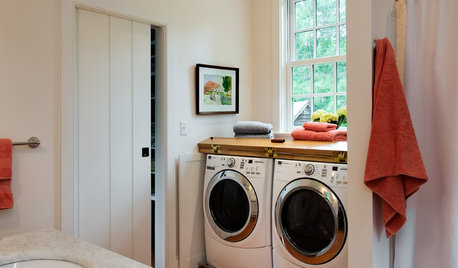Water Heater Timers
gwfl
13 years ago
Related Stories

GREAT HOME PROJECTSHow to Switch to a Tankless Water Heater
New project for a new year: Swap your conventional heater for an energy-saving model — and don’t be fooled by misinformation
Full Story
GREAT HOME PROJECTSHow to Add a Solar Water Heater
Lower energy bills without a major renovation by putting the sun to work heating your home’s water
Full Story
SAVING WATER11 Ways to Save Water at Home
Whether you live in a drought-stricken area or just want to help preserve a precious resource, here are things you can do to use less water
Full Story
HEALTHY HOMEHow to Choose a Home Water Filtering System
Learn which water purification method is best for your house, from pitchers to whole-house setups
Full Story
BATHROOM DESIGNWater Damage Spawns a Space-Saving Bathroom Remodel
A game of inches saved this small New York City bathroom from becoming too cramped and limited
Full Story
HOUSEKEEPING5 Steps to Improve Your Heating System Now
Increase your heater's efficiency and safety for lower energy bills and greater peace of mind this winter
Full Story
CONTAINER GARDENSContainer Garden Basics: How and When to Water Potted Plants
Confused about soil moisture, the best time to water and what watering device to use? This guide can help
Full Story
GREEN BUILDINGWater Sense for Big Savings
Keep dollars in your pocket and preserve a precious resource with these easy DIY strategies
Full Story
GARDENING GUIDESEssential Watering Tips for Your Edible Garden
To give your edible plants just what they need, check out these guidelines for how, when and how much to water
Full Story
GARDENING GUIDES9 Ways to Be Water-Wise in the Edible Garden
Consider these tips to get a healthy backyard crop that uses less water
Full StorySponsored
Franklin County's Custom Kitchen & Bath Designs for Everyday Living
More Discussions






seattlecraftsman
ionized_gw
Related Professionals
Vienna Handyman · North Druid Hills Kitchen & Bathroom Remodelers · Forest Hill Kitchen & Bathroom Remodelers · Glen Carbon Kitchen & Bathroom Remodelers · Lisle Kitchen & Bathroom Remodelers · Los Alamitos Kitchen & Bathroom Remodelers · New Port Richey East Kitchen & Bathroom Remodelers · Oceanside Kitchen & Bathroom Remodelers · Schiller Park Kitchen & Bathroom Remodelers · Superior Kitchen & Bathroom Remodelers · Terrell Kitchen & Bathroom Remodelers · Vista Kitchen & Bathroom Remodelers · Wilmington Kitchen & Bathroom Remodelers · Palestine Kitchen & Bathroom Remodelers · Tanque Verde Kitchen & Bath Fixturesattofarad
attofarad
gwflOriginal Author
attofarad
gwflOriginal Author
brickeyee